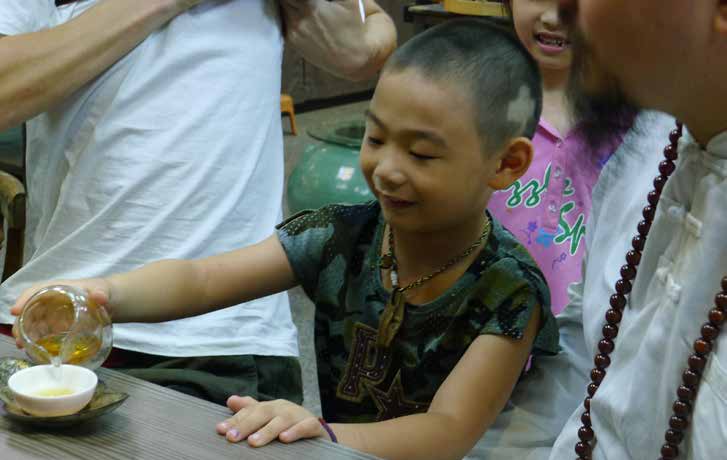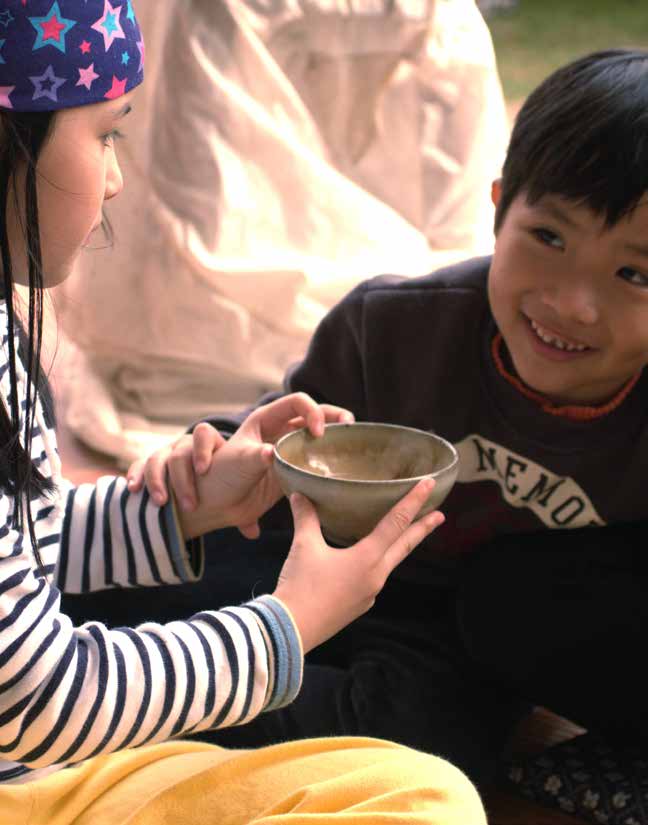
 |
|
Wu De recently painted a message to all students and guests on the wall above the kitchen table. The painting reads:
HOUSE RULES (non-negotiable): 1. Hug everyone in this house everyday. 2. Be in Love.
Last month, I discussed the first rule of Tea Sage Hut. Writing on that topic was a great way for me to absorb related lessons more deeply and, I hope, to help others along their journeys. Now, it feels like a good time to focus on the second rule both for my own learning and for others who may benefit from reading this.

Love is the most powerful energy that exists in this universe. It is an immense creative force which fuels our interpersonal connections, our connection to Nature, our work, our play and much more. Monuments to Love (such as the Taj Mahal), our countless Love stories (told in film, novels, songs and other media), and even the ways in which we use (over-use / avoid) the word "Love" all reflect our deep awe of Love's incredible power.
Our awe of Love carries within it both wonderment and fear. Why we would approach Love as beings full of wonder is easy to understand, but what about the fears of Love that so many people experience? If Love is a natural state of being (as so many spiritual people have claimed over the centuries), what is it that people fear so much about it?
Feeling Love is a powerful experience backed by infinitely powerful energy. And yet Love is often seen as a weakness, a vulnerability. This viewpoint has its own truths, but it is an extremely limited view, one which is confined to the egoic self. People with this viewpoint "Love" out of want and react to Love out of fear. They relate tumultuous emotions to "Love", and react to these emotions with an imbalanced and unskillful way of living. In this egoic state, "Love" is not an all-powerful creative force, but a restraint, a burden. It is something to grapple with rather than something to embrace and let emanate from you.
On what would seem to be the extreme end of the spectrum of Love as something to be feared, many enlightened writers have penned romantic tales comparing the act of loving to the act of dying. And yet, we so often find that these stories resonate deeply with us not at the level of fear, but as echoes of the eternal Divinity found within us. These wise souls' stories trigger in us a recognition of loving and dying as forces which kill egos and initiate transformations which expand consciousness far beyond the boundaries of the solitary self. If you view Love as something to be feared at this stage in your journey, that's okay. There's "nowhere you can be that isn't where you're meant to be." That includes fearing Love in all its awe-inspiring glory. And it also includes wanting Love without perceiving that it is all around you, all the time, and without deeply knowing that you wouldn't even exist if it weren't for the ceaseless Love of the universe. Experiencing that on a profound level takes work, but right now, acknowledging that you aren't there yet is a pivotal step. From that recognition, you will find that there are ways to get from fearing Love and craving Love to being in a deep state of Love, one borne out of an expanded perspective.
That path is what I'd like to talk about in this newsletter and the next one. In this issue, I'll be talking about loving people. Next newsletter, I'll talk about other expressions of Love, such as loving your work, loving tea and loving the Divine.
I don't dare claim to have mastered any of these forms of Love. If I've learned anything at all from interacting with those more enlightened than I, it is that spiritual work is a process, not a goal. There's great wisdom in returning to work on these themes over and over again with new understandings and new perspectives from your work in other areas. I encourage all of you (and myself!) to see that all of these topics loop back into each other: Tapping into the Universe's boundless Love in any of these forms causes Love to overflow into all areas of your life. Find the channels which carry Love's flow through you. Turn on the faucet - let the energy swirl, stream and spill into your tea, into your relationships, into your work and beyond...
If you do not have Love within you, you cannot share Love. If you do not know how to accept and forgive yourself unconditionally, you cannot accept or forgive others with any kind of consistency. I could go on with these trite-and-true basics, but you get the drift...
However, it's not quite so simple. There is a big "--WARNING--" to note: Do not mistake loving your egoic self for loving your higher self. Possessions, external beauty, status and the like are only transient, surface traits which do not reflect who you really are. And feeding your ego's ideas of what you "Love" about "yourself " will bring you great suffering when your circumstances change.
So, the skillful means of loving oneself is not in focusing on the Love of who you appear to be, but who you actually are. Who are you, then? You are a Divine being. (Don't believe me? Read it again. If it helps, say it out loud: I am a Divine being. Really feel it.)
When you can feel the Divinity within yourself, celebrate it! Be aware of that Divinity when you meditate and when you drink tea. Honor it and trust it when you make decisions, be they big or small. Learn how to be and Love your Divine self. And each time you work with these different types of Love, allow the Love of your higher self to deepen as you merge more and more into it.
Through spiritual practice and honoring your higher self, you can change your relationship to yourself drastically. As you learn to make decisions that feed your Divinity rather than your ego, you will find that your interactions with others are utterly changed.
Perhaps this shift occurs because more self-acceptance leads to more acceptance of others, or because you become a much happier person when you follow your bliss, or because being honest and authentic with yourself allows you to be more authentic and honest with others. It could also be that resting in your higher self provides an awareness of your own completeness, thus freeing you from neediness and other unhealthy relationship behaviors. Whatever the reason, you will likely be able to forge much closer, deeper relationships with others when you are able to Love yourself.

Beyond that, spiritual work helps you to know that, as a Divine being, you are a fragment of the same (wonderful, lovable) stuff as everyone else. This has many implications, but now I'll focus on just one: Each time you interact with another person, you are interacting with another aspect of your Divine nature. So loving another means loving yourself. Helping another means helping yourself. Forgiving another means forgiving yourself. And so on. You don't lose anything by loving. You are giving of yourself to yourself, and the Divine essence in both of you is learning from the perceived exchange.
From where I stand now, the difference between what people usually think of as "Love" and conscious, unconditional Love is summed up by one simple statement: Love does not want or fear anything.
Unconditional Love is accepting of other people's higher selves regardless of the situation at hand. Conscious Love recognizes that there is nothing to want (because you already have all that you need; others can't fix things for you in any kind of a lasting, meaningful way and no external circumstances can satiate your internal sense of lack) and there's nothing to fear (because Love is a creative power, not a destructive force, and there is nothing whatsoever to be lost if you approach Love with the right understanding of it).
Unconditional Love doesn't place demands. It doesn't have ultimatums. It is for the sake of being and it gives for the sake of giving. And by loving yourself unconditionally, you can begin to share unconditional Love with others, and to amplify that Love back to each other.
The pattern of fearing Love and reacting to Love with imbalance applies to all sorts of relationships, but it is generally most visible in the realm of romantic Love. Many romantic relationships are based on especially unrealistic desires and irrational fears, and are not rooted in Truth.
For me, romantic Love was like this for many years. "Love" meant feelings of needing to be with someone coupled with fears of real intimacy. In retrospect, this was merely a means to distract myself from real growth. I was focused on striving for flimsy external changes instead of on initiating substantial changes from within. So much drama and distress because I was afraid to accept things as they were and work from there! Through spiritual practice, all that changed...
When the universe decided I was ready, I met Merlin (Yes, that's his real name!). From the start, our relationship has been refreshingly free of neediness, drama, games, projections, assumptions and expectations. Instead, the focus has always been celebrating the Divinity we see so clearly in each other. Complete trust, acceptance and forgiveness are easy for us to share. Despite this, we're not dependent on each other. Rather, we relish having space to walk our paths separately, then return to each other to share what we have discovered along the way.
Through my relationship with Merlin, I've begun to see unconditional Love brimming over into other areas of my life. It gradually teaches me to see the Divinity not just in Merlin, but in everyone. And what a beautiful lesson that is turning out to be!
Developing loving relationships with close friends can be one of the healthiest things you ever do, especially when these friends are part of your living community.
I'm not talking about pals or chums here. Sure, those kinds of friends offer surface-level overlaps and perhaps deeper bonds, but their essential function is to enable your garbage rather than help you get over your ego drama and do real spiritual work. True friends, on the
other hand, have an ability to see beyond the transitory phases of who you appear to be and to peer into the depths of your true nature. They'll give you space to grow into your higher self. They'll also give you an earful of truth when it's necessary for growth, even if hearing the truth is painful. Above all, they want what's best for the real you. These kinds of friends are treasures. Love them and grow with them!
People often quip that the true measure of your spiritual development is how you respond to spending a week with your family. I'm lucky (My family is great!), but many people are not so fortunate. Still, even in dysfunctional families, there is often some sense of sticking by each other no matter what. Sure, you might disagree or even fight, but when it really matters, you're there for each other.
The same holds true in a spiritual community. The difference is that (presumably) everyone is there to do spiritual work. As people on a spiritual path, members of such a community are more likely to be able to identify human interactions as opportunities for growth. That doesn't mean that we don't disagree (or even fight). We do! But the way we do it tends to be different. We strive to recognize the best in each other, accepting shortcomings while simultaneously encouraging each other to improve based on where we are now.
Wu De is my spiritual brother, my housemate and my dear friend. But he is also my spiritual teacher and, as such, is in a separate category.
Loving a spiritual teacher is different from any of the other kinds of Love I've mentioned so far. Why? A spiritual teacher's job is to break down your ego, and your ego is going to hate that. On top of that, a more Zen spiritual teacher (such as Wu De) tends to break down your mind in particular ways, like telling you to do one thing, then telling you the opposite a few days later and pretending the former never happened. And if you're anything like me, then your mind is really gonna hate that.

So to be a spiritual student without flipping out on your teacher, you have to work at not resting in your ego and not resting in your mind. Conveniently, this leaves you the opportunity to rest in your heart. Do that. Linger there. Get real cozy. Once you do, you'll likely find that it's where the real you wanted to be all along AND that it's easy to Love your teacher (and pretty much everyone else) from that resting spot.
Another important distinction to make when talking about loving a spiritual teacher is that "teacher" and "student" are merely roles, and at a deeper level what's happening during teaching is a transfer of energy. Worldly people often see spiritual teachers as swindlers who take resources from students while offering little in return. This is a flawed view. As I mentioned above, it's not possible for anything to get lost in the exchange when giving Love consciously. Beyond this, Love for a true spiritual teacher is amplified back many times over (even if your teacher gives you nothing but hassle on the surface level). Powerful energy flows from spiritual teachers to students, and this energy is a form of Love. Along with external teachings, this energy fosters enormous growth in students who are ready to welcome it. As this is something which goes far beyond loving an individual person (and as it is something I am only now beginning to understand), I'll talk about it more in next month's newsletter. Until then, much Love to all of you, and may Love pour through you in all that you do!
